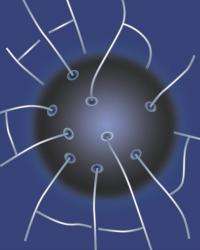January 3, 2012 feature
Physicists propose test for loop quantum gravity

(PhysOrg.com) -- As a quantum theory of gravity, loop quantum gravity could potentially solve one of the biggest problems in physics: reconciling general relativity and quantum mechanics. But like all tentative theories of quantum gravity, loop quantum gravity has never been experimentally tested. Now in a new study, scientists have found that, when black holes evaporate, the radiation they emit could potentially reveal “footprints” of loop quantum gravity, distinct from the usual Hawking radiation that black holes are expected to emit.
In this way, evaporating black holes could enable the first ever experimental test for any theory of quantum gravity. However, the proposed test would not be easy, since scientists have not yet been able to detect any kind of radiation from an evaporating black hole.
The scientists, from institutions in France and the US, have published their study called “Probing Loop Quantum Gravity with Evaporating Black Holes” in a recent issue of Physical Review Letters.
“For decades, Planck-scale physics has been thought to be untestable,” coauthor Aurélien Barrau of the French National Institute of Nuclear and Particle Physics (IN2P3) told PhysOrg.com. “Nowadays, it seems that it might enter the realm of experimental physics! This is very exciting, especially in the appealing framework of loop quantum gravity.”
In their study, the scientists have used algorithms to show that primordial black holes are expected to reveal two distinct loop quantum gravity signatures, while larger black holes are expected to reveal one distinct signature. These signatures refer to features in the black hole’s energy spectrum, such as broad peaks at certain energy levels.
Using Monte Carlo simulations, the scientists estimated the circumstances under which they could discriminate the predicted signatures of loop quantum gravity and those of the Hawking radiation that black holes are expected to emit with or without loop quantum gravity. They found that a discrimination is possible as long as there are enough black holes or a relatively small error on the energy reconstruction.
While the scientists have shown that an analysis of black hole evaporation could possibly serve as a probe for loop quantum gravity, they note that one of the biggest challenges will be simply detecting evaporating black holes.
“We should be honest: this detection will be difficult,” Barrau said. “But it is far from being impossible.”
He added that black holes are not the only possible probe of loop quantum gravity, and he’s currently investigating whether loop quantum gravity might have signatures in the universe’s background radiation.
“I am now working on the cosmological side of loop quantum gravity,” Barrau said. “This is the other way to try to test the theory: some specific footprints in the cosmic microwave background might be detected in the future.”
More information: A. Barrau, et al. “Probing Loop Quantum Gravity with Evaporating Black Holes.” Physical Review Letters 107, 251301 (2011). DOI: 10.1103/PhysRevLett.107.251301
Journal information: Physical Review Letters
Copyright 2012 PhysOrg.com.
All rights reserved. This material may not be published, broadcast, rewritten or redistributed in whole or part without the express written permission of PhysOrg.com.















